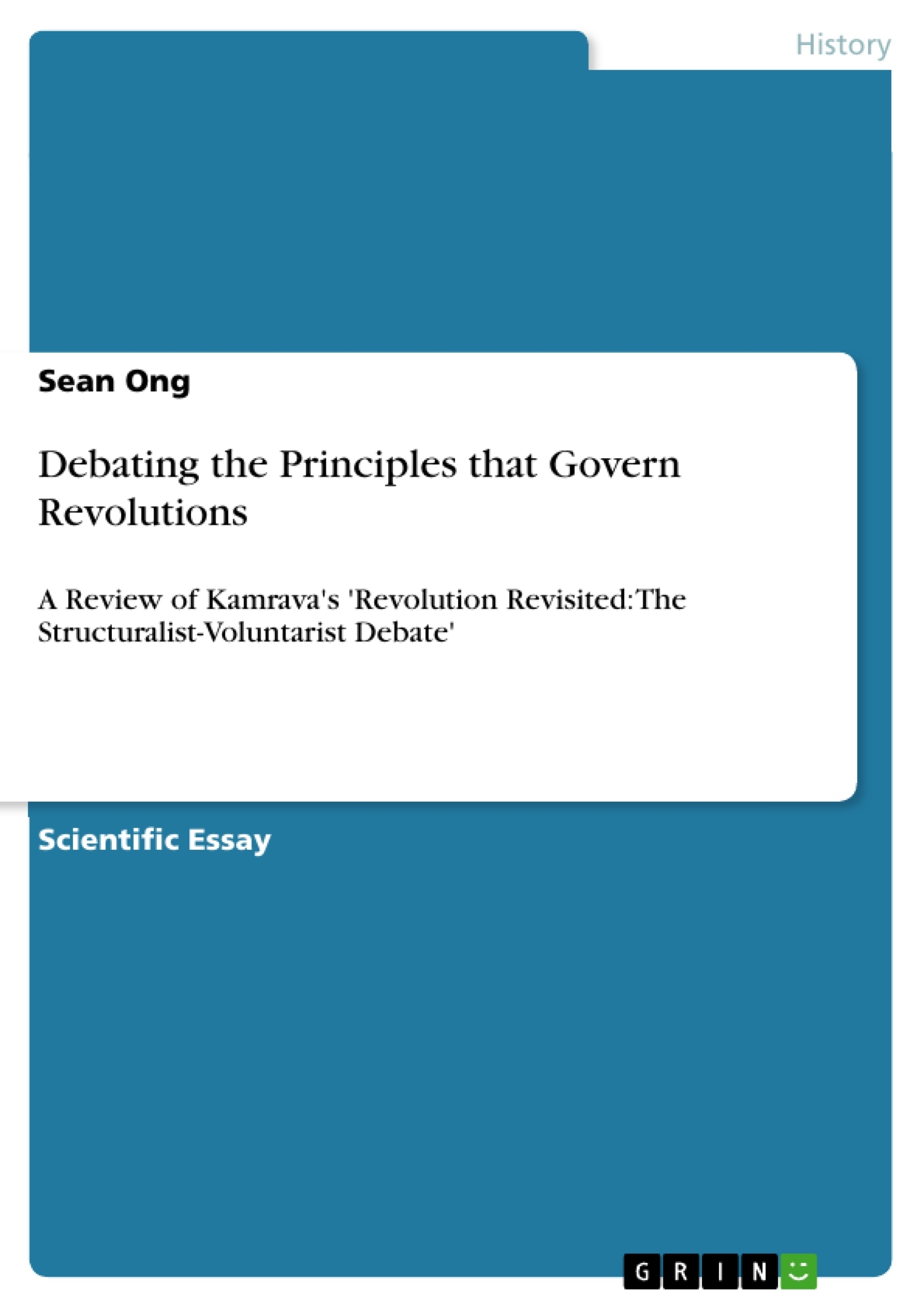Revolutions have always remained the fascination of many academics. Studied and exploited in a wide variety of forms for an even larger range of reasons, by both dictators, historians and sociologists alike, the framework through which revolutions are analysed and broken down, as well as the principles of revolution, has evolved over the years as a greater number of ‘revolutions’ began to occur, with increasingly divergent characteristics. Much debate has ensued, largely focused on the different types of revolutions, the role of structure versus human agency, how ‘revolutionary success’ can be measured and defined, and whether or not revolutions must solely be studied in context and hence greater comparative and generalising statements cannot be effectively drawn from the study of revolutions.
Inhaltsverzeichnis (Table of Contents)
- Debating the Principles that Govern Revolutions
- Spontaneous Revolutions
- Planned Revolutions
- Negotiated Revolutions
- The French Revolution
- The French Revolution: A Catalyst for Change?
- Success and Violence in the French Revolution
- Beyond Structural Change
- State, Society, and Violence
- The Reign of Terror: A Necessary Evil?
- Violence as a Catalyst
Zielsetzung und Themenschwerpunkte (Objectives and Key Themes)
This article explores the debate surrounding the principles that govern revolutions, focusing specifically on the work of Mehran Kamrava. The article aims to analyze the roles of human agency and structural factors in driving revolutionary change. It also examines the concept of "revolutionary success" and the relationship between violence and revolutions.- The role of human agency and structural forces in driving revolutions
- The different types of revolutions: spontaneous, planned, and negotiated
- The definition and measurement of "revolutionary success"
- The role of violence in revolutionary action
- The significance of historical context in analyzing revolutions
Zusammenfassung der Kapitel (Chapter Summaries)
The article begins by introducing Kamrava's framework for understanding revolutions, which distinguishes between spontaneous, planned, and negotiated revolutions. It argues that both human agency and structural factors play important roles in all three types of revolutions. The article then focuses on the French Revolution as a case study. It examines the role of long-term causes, such as the weakening of the monarchy and the rise of Enlightenment ideas, in setting the stage for the Revolution. The article also discusses the distinction between political and systemic revolutions, arguing that the French Revolution involved both a change in the style of political rule and a transformation of the socio-economic structure. The article concludes by exploring the role of violence in revolutions. It argues that violence can be seen as a catalyst for revolutionary change, but it also raises questions about the justification and consequences of violence. The article uses the example of the Reign of Terror in France to illustrate the potential costs of violence. The article does not include a summary of the conclusion, final chapter, or any sections containing major revelations or spoilers.Schlüsselwörter (Keywords)
The key concepts explored in this article include: revolutions, human agency, structural forces, spontaneous revolutions, planned revolutions, negotiated revolutions, French Revolution, revolutionary success, violence, historical context, state, society, Reign of Terror.Frequently Asked Questions
What are the different types of revolutions according to Mehran Kamrava?
Kamrava distinguishes between spontaneous, planned, and negotiated revolutions, each driven by a different mix of human agency and structural factors.
What is the role of human agency versus structure in a revolution?
The debate focuses on whether revolutions are caused by long-term socio-economic structures or by the intentional actions and leadership of individuals (human agency).
How is "revolutionary success" defined and measured?
Success can be measured by political change (rule of law) or systemic change (transformation of the socio-economic structure), as seen in the French Revolution.
Is violence a necessary catalyst for revolutionary change?
The article explores violence as a potential catalyst but also examines its costs and consequences, using the "Reign of Terror" as a historical example.
Why is historical context important in analyzing revolutions?
Academic debate questions whether general statements can be drawn from revolutions or if they must be studied solely within their unique historical and social contexts.
- Citar trabajo
- Sean Ong (Autor), 2012, Debating the Principles that Govern Revolutions, Múnich, GRIN Verlag, https://www.grin.com/document/202701



